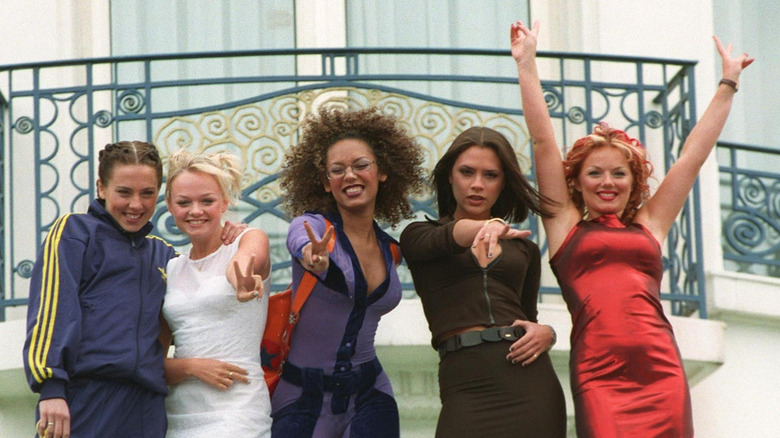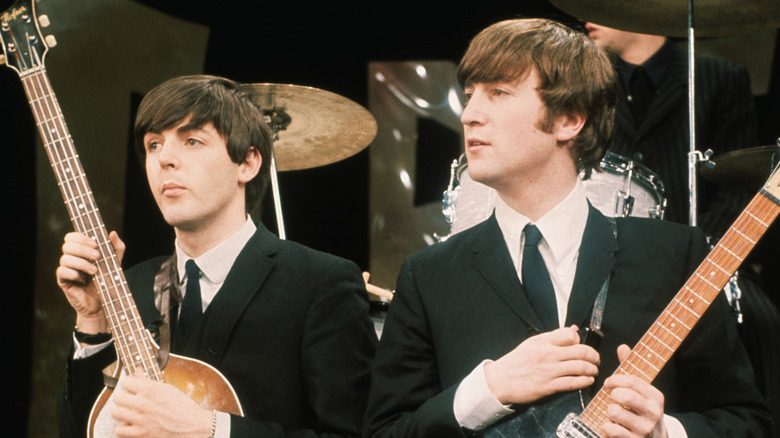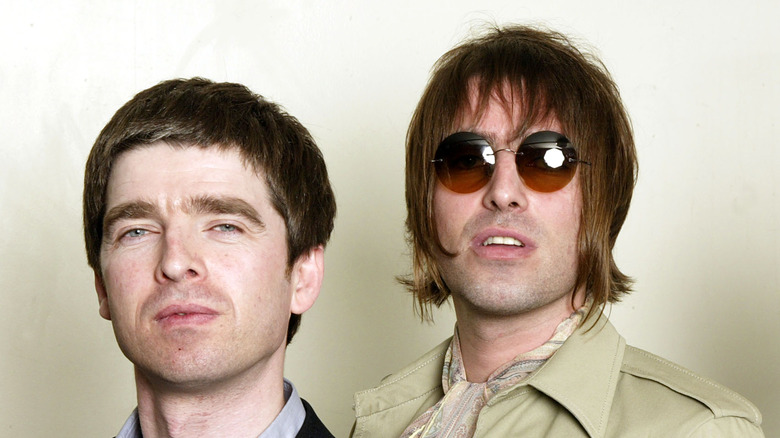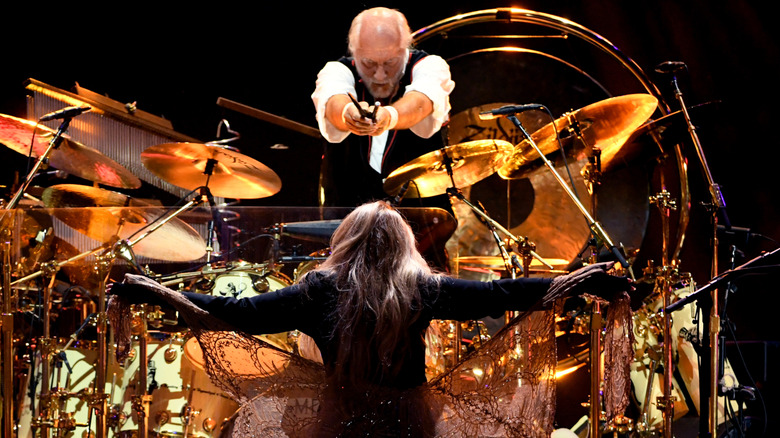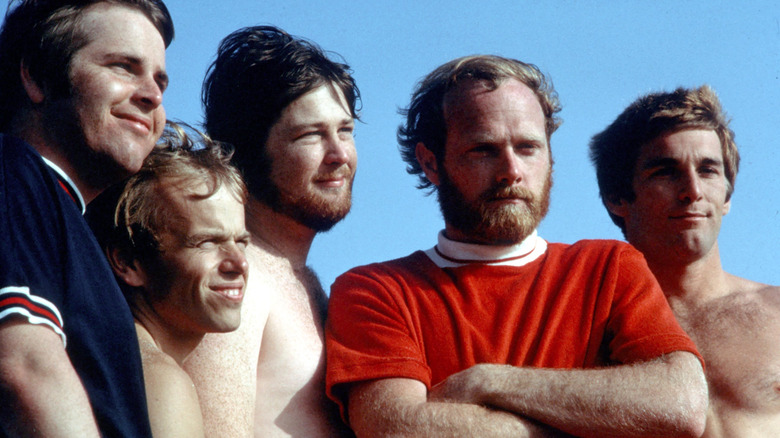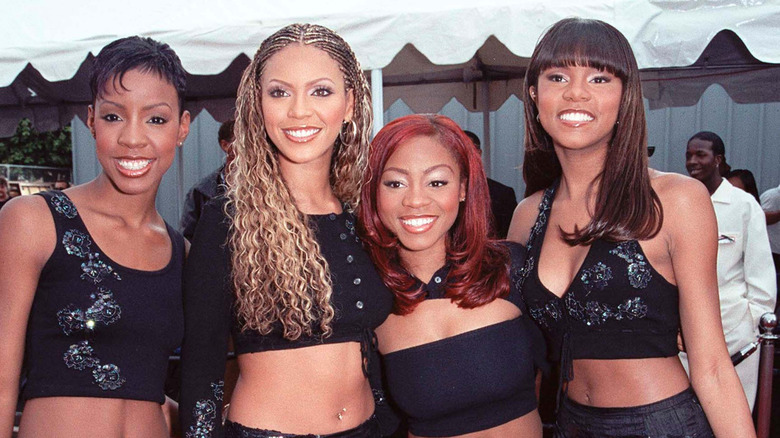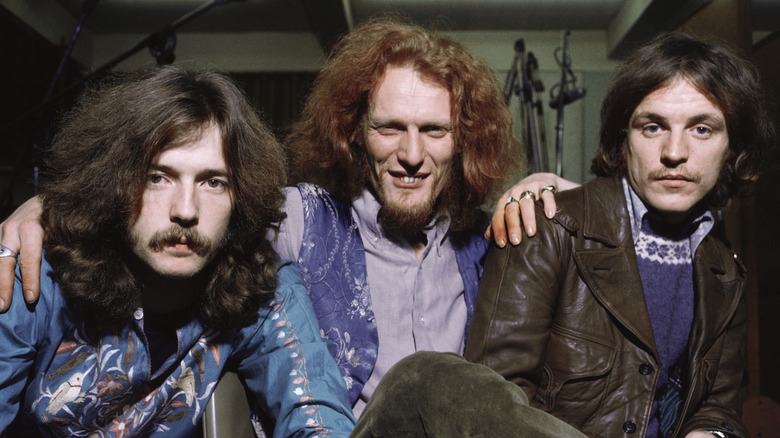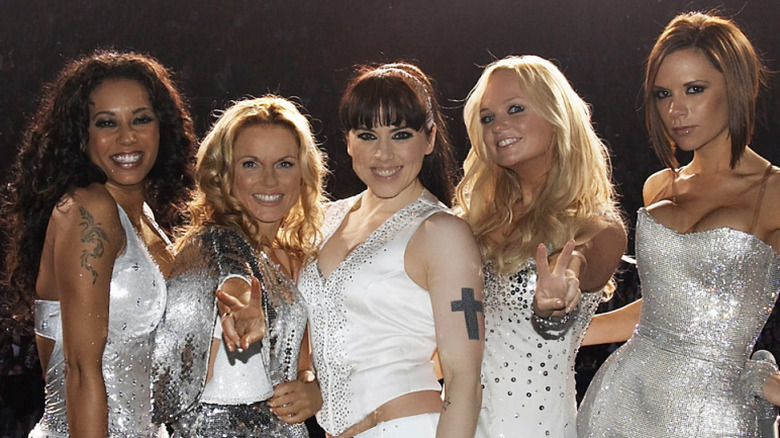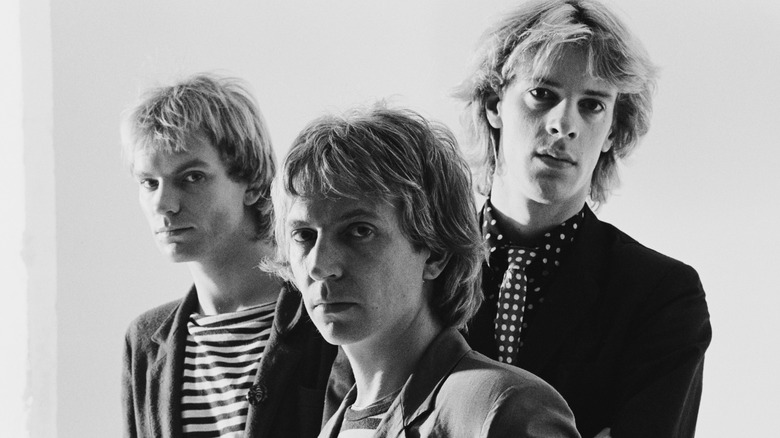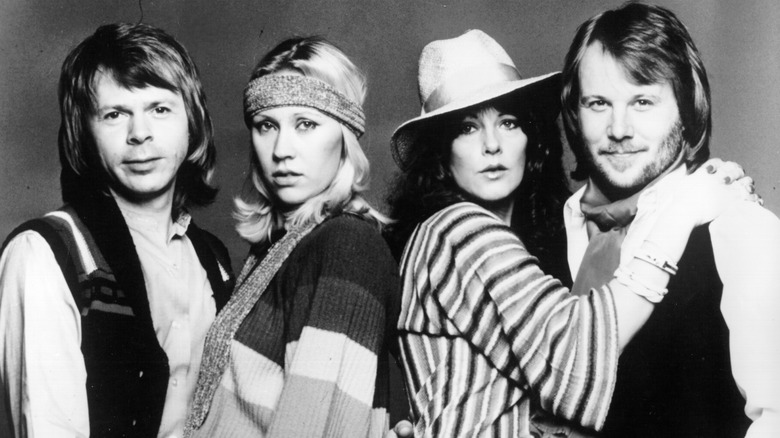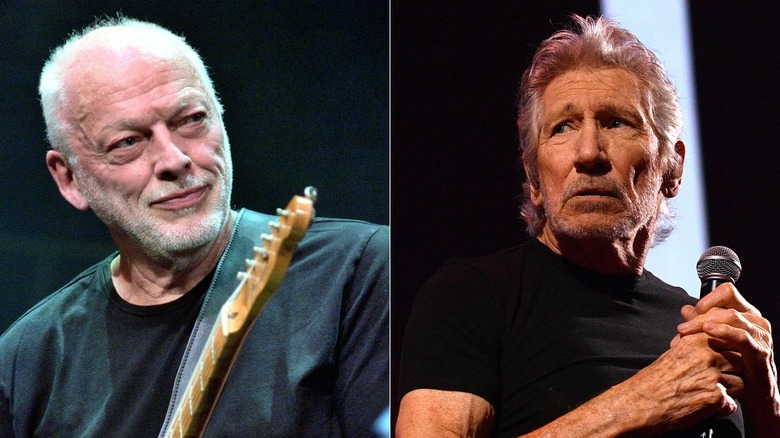Bandmates That Had A Lot To Say After Their Break Ups
We may receive a commission on purchases made from links.
Music has been a thing since humans banged a bone against a rock. Over the centuries, the concept has expanded, covering multiple genres and having a global influence. Since the birth of rock 'n' roll in mid-1950s America, hundreds of bands have come and gone. Most of them barely made a ripple, but others literally struck a chord, for a while becoming the biggest groups on the planet in the process.
For over 70 years, each generation has been whipped into a frenzy by a rock or pop phenomenon. From The Beach Boys to The Spice Girls, fans loved them unconditionally. But what happened when the creative steam ran out or relationships turned sour? What happened after the band broke up? The answer is a lot of chatter, and not just among the fans or the press. Here's a closer look at several bandmates who had plenty to say after their breakups.
The Beatles
Formed in 1959, The Beatles had their first No.1 hit in 1963 and topped the Billboard 100 album chart 14 times before their breakup in 1970. Decades later, the surviving bandmates haven't stopped talking about it. Commenting on the disharmony in their final months, Ringo Starr said in the 1995 "The Beatles Anthology" series: "There was no magic and the relationships were terrible. I knew we were all in a messed-up stage" (via Clash Music).
According to John Lennon, McCartney was the reason for the split. "Paul took over and supposedly led us, you know, but what is leading us when we went around in circles?" he commented in a 1970 interview shared on the YouTube channel RockinRolla. Lennon also denied Yoko Ono was the cause, telling Dick Cavett the following year: "The Beatles were drifting apart on their own." Paul McCartney had a different assessment, revealing to Howard Stern in 2018 that it was John who pulled the plug.
McCartney explained that, while the band was initially thrown off by Yoko's presence in rehearsals, "Looking back, the guy was totally in love with her, and you know, you've just gotta respect that." He added he was pleased to have patched things up with Lennon before his death. Had it not happened, McCartney told Stern: "I don't know how I would have dealt with that."
Oasis
In four years, Gallagher brothers Liam and Noel went from playing a pantomime cow on the 1990 Reading Festival stage to topping the charts with their band Oasis. They caught beef with many stars, from Blur to Jay-Z, but the biggest conflicts of all were between the Gallaghers themselves, though, as the 1994 "Wibbling Rivalry" interview proved, they started long before the official 2009 split.
In April that year, Noel told Q magazine Liam was "the angriest man you'll ever meet. He's like a man with a fork in a world of soup" (via Gigwise), which Liam referenced a decade later in this post on then-Twitter. A few years later, while taking potshots at Noel's new band High Flying Birds, he said to Q: "He blew it. He could have said, I was a d**k, he was a d**k, that's life, it's 2011, here's my f***ing record" (via Gigwise).
By 2016, Liam nicknamed Noel the "potato" in his posts on then-Twitter, but when asked about his brother's music in a 2019 interview with The Guardian, Noel replied: "I think it's unsophisticated music. For unsophisticated people. Made by an unsophisticated man." By 2023, Liam's tone had softened, admitting to Music Matters that he and Noel did have some good times with Oasis. Two years later, a reunion gig finally happened, but rumors soon swirled that not all was not well between the brothers...
Fleetwood Mac
Founded in 1967 by Mick Fleetwood, John McVie, Jeremy Spencer, and Peter Green, the first line-up change for Fleetwood Mac came in 1970, when Green quit and Christine McVie came on board. By 1974, Spencer and his replacement Bob Weston were out, while couple Stevie Nicks and Lindsey Buckingham were in. As the band's fame grew, their relationships became increasingly fraught, amplified by drugs and alcohol.
Matters weren't helped by the 1977 affair between Nicks and Fleetwood. The singer told Rolling Stone 20 years later that she and Buckingham never spoke about the fling, but throughout the 1980s, the pair fought off stage and on. By 1987, he quit to pursue solo work, claiming it was always the plan, but Stevie Nicks described the atmosphere: "You don't want to sit in the same room, be on a plane after a show, with somebody who hates you. It was not fun."
Nicks and Christine McVie left in 1990, but the band reformed briefly to play at Bill Clinton's 1993 inaugural ball. McVie stepped down again five years later, returning in 2014, admitting to People: "I'd like to say it's like falling off a log, but it's a little more complicated than that." In 2018, Buckingham was fired (though he wasn't the first), sparking a legal battle and a war of words between him and Nicks, who he claimed was trying to mold the band's direction. In November 2022, McVie died, ending hopes of another reunion. Mick Fleetwood told MOJO: "Losing sweet Christine was catastrophic."
The Beach Boys
Amazing music made The Beach Boys famous, but their relationships were rarely as harmonious. Dennis and Brian Wilson formed the band in 1961 with their cousin Mike Love and friend Al Jardine. From the outset, Brian was the creative driving force, but within three years was burned out, stopping live touring in 1964.
He was seen as the core of the band, but when his brother Dennis quipped, "He is all of it. Period. We're nothing. He's everything," per Rock and Blues Muse, it wasn't a compliment. During the 1960s, Brian began taking LSD, describing it as "a very religious experience" to Tom Nolan of the Los Angeles Times WEST magazine, while working on the "Pet Sounds" album, which bolstered his reputation as a musical genius.
Mike Love did not share that view and thought Brian's drug use was "destroying Brian's brain." Speaking to Goldmine Magazine in 1992, he said: "Some of the words were so totally offensive to me that I wouldn't even sing 'em because I thought it was too nauseating." The same year, he successfully sued Wilson twice: For defamation and non-payment of royalties. By 2016, when "Pet Sounds" turned 50, Love had changed his tune, telling Best Classic Bands rumors that he didn't like the album were "completely asinine." Eventually, he and Wilson's long-running feud came to an end, and Love called him "the soul of our sound" in a poignant Instagram post after Wilson's death in 2025.
Simon & Garfunkel
"I have always loved my partner, and I know that is reciprocal. Reunion? It is a significant question. Paul and I will keep talking," Art Garfunkel told People in 2025. Considering he and Paul Simon had spent much of their 65-year careers arguing, it was an interesting statement. The two cut their first record in 1957, and from the start, their relationship was fragile, especially after Simon forgot to tell Garfunkel he'd been asked to record two solo songs.
The latter wrote in his autobiography "What Is It All but Luminous: Notes from an Underground Man": "The friendship was shattered for life ... I never forget, and I never really forgive" (via Smooth Radio). Garfunkel caused resentment too, as Simon explained to Howard Stern in 2024. While working on "Bridge Over Troubled Water," Garfunkel admitted he had kept mum about his latest film so Simon wouldn't drop the album. The latter told Stern: "I thought, 'I gotta get out of here.'"
The pair split from 1970 and 1981, reuniting for a now-legendary concert in New York's Central Park. They teamed up again in 1993 and 2003, but Garfunkel's decision to cancel a 2010 tour amid issues over his voice infuriated Simon. In Robert Hilburn's biography, "Paul Simon: The Life," he said: "He let us all down. I was tired of all the drama. I didn't feel I could trust him anymore" (per FAR OUT).
Destiny's Child
Houston-based Girl's Tyme was born in 1990 and comprised Kelly Rowland, LeToya Luckett, LaTavia Roberson, and Beyoncé Knowles. Renamed Destiny's Child in 1997, they enjoyed success until, in December 1999, LaTavia and LeToya told the band's manager they were quitting. In a lengthy 2001 interview with VIBE, Beyoncé said the group had put on a brave face for fans for years, and likened it to "being in a bad marriage when you have kids and you act like you're happy."
Beyoncé and Kelly claimed their bandmates were more focused on "boys" than on working. In early 2000, the women both wrote to LaTavia and LeToya complaining about their behavior, with Kelly saying, in part: "I refuse to be run over and receive punches from y'all." LaTavia and LeToya promptly filed lawsuits, while trading blows with their former manager in the media, but settled after several months and agreed to not sling any more public mud.
More than a decade after Kelly Rowland announced on stage that Destiny's Child would split for good in 2005, LaTavia spoke publicly about her experience in the band. "It was almost like a bad divorce — you're no longer with your friends, people that you love so much," she told People in 2016. Two years later, in an episode of "T.I. & Tiny: Friends & Family Hustle," LeToya said: "Did it hurt? Absolutely. Because we were friends. I went to school with these girls."
Cream
For many, Cream was the first and best supergroup. Founded by Jack Bruce and Ginger Baker, members of The Graham Bond Organisation, and Eric Clapton in 1966, they were masterful musicians, producing four incredible albums before disbanding in 1969. According to Clapton, a negative Rolling Stone review prompted him to call it quits, telling the magazine in 1985: "The ring of truth just knocked me backward; I was in a restaurant and I fainted. After I woke up, I immediately decided that it was the end of the band."
Baker and Bruce, who came to blows in the GBO, tried to set aside their mutual loathing for Cream. While Baker regarded Clapton as one of his best friends, it wasn't the same for Bruce. He described him as "Jekyll and Hyde" in a 2015 interview with Forbes, and although it took almost 40 years for Cream to reunite, the animosity resurfaced during their New York shows in 2005. Ironically, during the preceding London gigs, all was well, as Bruce told GuitarWorld at the time: "Ginger said to me, 'You are a great bass player after all.' I couldn't believe it — he'd never once said that in all the years."
The Spice Girls
Sporty, Ginger, Posh, Baby, and Scary Spice — aka Mel C, Geri Halliwell, Victoria Adams (later Beckham), Emma Bunton, and Mel B — burst onto the British music scene in 1996 with their infectious hit "Wannabe," and carved a chaotic path across the world, trailing "Girl Power" in their wake, until they split in 2001. However, the group had initially fractured just under three years earlier, when Geri quit.
In the 2007 BBC documentary "Giving You Everything," Halliwell said: "I just felt empty and that I'd given them everything I could." Three years later, she claimed the rest of the band knew about her decision, and in 2017, after apologizing in a now-deleted post on Twitter, she said to Larry King: "I was only young at the time, I didn't have that skillset to kind of work through it."
"I don't think we actually thought that she left," said Beckham in the BBC film, while Bunton said she was personally "distraught." Mel B told Larry King in 2014 that things were bitter "for a long time between me and her," before they made peace. The band has reformed several times since 2001, though not always with Beckham. In 2025, Mel C hinted on "The Jimmy & Nath Show" on 2Day FM in Australia that the Spice Girls could celebrate the 30th anniversary of "Wannabe," suggesting: "A nice little world tour" (per The Standard).
Rage Against the Machine
The tensions in Los Angeles in the early 1990s were grist to the mill for Rage Against the Machine, formed by Zack De La Rocha, Tim Commerford, Brad Wilk, and Tom Morello. Their debut, eponymous album went triple platinum, and for a decade they combined outstanding music with powerful political messaging, until De La Rocha called it a day in 2000. In a short statement, he said the band's "decision-making process has completely failed," via Screen Rant.
Wilk, Commerford, and Morello joined Chris Cornell to form Audioslave, but in 2018, in an interview with Lars Ulrich, Morello got into the reasons behind RATM's split. Including himself, he said the group lacked the "emotional maturity of being able to deal with each other as people." Morello added that, although their live gigs were unaffected, the band's inability to agree "unearthed feelings that made it hard to make records."
When Chris Cornell left Audioslave in 2007, RATM reformed and hit the road, before splitting in 2011. They got back together again in 2020, but the tour was disrupted by Covid. After they picked back up, De La Rocha's early ankle injury forced them to cancel all but the first leg of dates. In 2023, Morella was alone on the stage as RATM were inducted into the Hall of Fame, and a year later, Brad Wilk posted on Instagram that the band would "not be touring or playing live again."
The Police
London's creative, vibrant punk scene was where musicians Gordon Sumner — aka Sting — Andy Summers, and Stewart Copeland met, forming The Police in 1977. Although the trio's relationship was volatile thanks to the near-constant power struggle with Sting, by the time he decided to leave the Police and go solo in 1984, they had produced five albums and some incredible music.
In a joint interview for Revolver magazine in 2000, Copeland said the group's tensions "gave us an edge, but when it got bitter, it was what tore us apart," per Sting.com. Talking about making their last album, "Synchronicity," the drummer said: "We hated each other's guts, and we had no respect for each other." But, when the 2005 documentary film "Can't Stand Losing You: Surviving the Police" was released, Summers said of Sting: "He's a very gifted artist and a great musician. I only have great respect for him." (via The Daytona Beach News-Journal)
From 2007 to 2008, The Police reformed for a world tour, but have since been content to go their separate ways. In 2024, discussing the original split, Summers told Ultimate Classic Rock, "No one wanted us to break up, but Sting wanted to go and be the thing all on his own," per Gold Radio. At the same time, in a MOJO interview, Copeland said about another Police reunion: "There's at least a 0000000000000000000000.1 per cent chance of it ever happening."
ABBA
Benny Andersson, Björn Ulvaeus, Agnetha Fältskog, and Anni-Frid Lyngstad, aka Swedish quartet ABBA, showed that marriage and music could be combined — for a while. They had been together for a couple of years and changed their name shortly before winning the 1974 Eurovision Song Contest with the hit "Waterloo."
By the end of the decade, they were one of the world's biggest bands, but their relationships were faltering. Björn and Agnetha, married in 1971 and divorced in 1980, and Benny and Frida married in 1978 after a long engagement, but divorced less than three years later. In 1982, in a tense appearance on the BBC's "The Late, Late Breakfast Show," Ulvaeus dismissed rumors that ABBA was on the brink of breaking up, saying it would only happen if it "wasn't fun anymore."
Yet, shortly after, ABBA did split up. Benny explained why they stuck it out to The Guardian 20 years later, saying: "We felt like we had something so valuable in the group that, even though it was difficult, we didn't want to break that up. And to prove it, we did some of our best stuff after that." It included "The Winner Takes It All" and, in the 2024 documentary "ABBA: Against the Odds," Fältskog explained how the song reflected a change of mood. "It was not so fun anymore to record. There was something in the atmosphere. A bit tragic" (via People).
Pink Floyd
Named after blues musicians Pink Anderson and Floyd Council, Pink Floyd was formed by Syd Barrett, with Roger Waters, Rick Wright, and Nick Mason in 1965, with Dave Gilmour replacing an increasingly erratic Barrett in 1968. Despite the latter not being the easiest of bedfellows with Waters, the band was responsible for landmark music, including albums "The Dark Side of the Moon" and "The Wall."
Despite the success, cracks were showing. Discussing the song "Comfortably Numb," in a 1992 interview with Musician magazine, Waters said about Gilmour: "It was clear at that point that we didn't feel the same way about music." The 1983 "The Final Cut" album was dominated by Waters, and two years later, he quit. Although the band continued under Gilmour (despite a failed legal action from Waters claiming the band was a "spent force creatively") in 2015, he said: "It has run its course, we are done." (per Billboard).
In 2018, Nick Mason quipped to Rolling Stone: "I think it's really disappointing that these rather elderly gentlemen are still at loggerheads," but the Waters-Gilmour feud kicked off again in 2022, amid Waters' secret, solo rerecording of "The Dark Side of the Moon." Gilmour's partner, Polly Samson, accused him of being a "Putin apologist" in a post on X. Waters responded on Instagram, calling Samson's accusations "incendiary and wildly inaccurate." As for Gilmour? In 2024, he told MOJO that talking about Waters was "wearisome" and asked, 40 years after he quit Pink Floyd: "Where's the relevance?"
